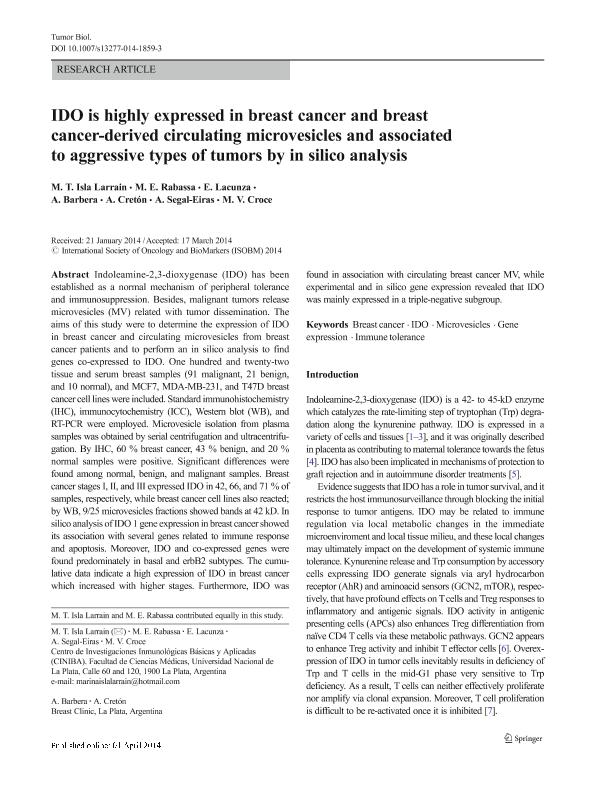Artículo
IDO is highly expressed in breast cancer and breast cancer-derived circulating microvesicles and associated to aggressive types of tumors by in silico analysis
Isla Larrain, Marina Teresita; Rabassa, Martín Enrique ; Lacunza, Ezequiel
; Lacunza, Ezequiel ; Barbera, A; Cretón, A.; Segal Eiras, Amada; Croce, María Virginia
; Barbera, A; Cretón, A.; Segal Eiras, Amada; Croce, María Virginia
 ; Lacunza, Ezequiel
; Lacunza, Ezequiel ; Barbera, A; Cretón, A.; Segal Eiras, Amada; Croce, María Virginia
; Barbera, A; Cretón, A.; Segal Eiras, Amada; Croce, María Virginia
Fecha de publicación:
07/2014
Editorial:
Karger
Revista:
Tumor Biology
ISSN:
1010-4283
Idioma:
Inglés
Tipo de recurso:
Artículo publicado
Clasificación temática:
Resumen
Indoleamine-2,3-dioxygenase (IDO) has been established as a normal mechanism of peripheral tolerance and immunosuppression. Besides, malignant tumors release microvesicles (MV) related with tumor dissemination. The aims of this study were to determine the expression of IDO in breast cancer and circulating microvesicles from breast cancer patients and to perform an in silico analysis to find genes co-expressed to IDO. One hundred and twenty-two tissue and serum breast samples (91 malignant, 21 benign, and 10 normal), and MCF7, MDA-MB-231, and T47D breast cancer cell lines were included. Standard immunohistochemistry (IHC), immunocytochemistry (ICC), Western blot (WB), and RT-PCR were employed. Microvesicle isolation from plasma samples was obtained by serial centrifugation and ultracentrifugation. By IHC, 60 % breast cancer, 43 % benign, and 20 % normal samples were positive. Significant differences were found among normal, benign, and malignant samples. Breast cancer stages I, II, and III expressed IDO in 42, 66, and 71 % of samples, respectively, while breast cancer cell lines also reacted; by WB, 9/25 microvesicles fractions showed bands at 42 kD. In silico analysis of IDO 1 gene expression in breast cancer showed its association with several genes related to immune response and apoptosis. Moreover, IDO and co-expressed genes were found predominately in basal and erbB2 subtypes. The cumulative data indicate a high expression of IDO in breast cancer which increased with higher stages. Furthermore, IDO was found in association with circulating breast cancer MV, while experimental and in silico gene expression revealed that IDO was mainly expressed in a triple-negative subgroup.
Palabras clave:
Breast Cancer
,
Ido
,
Microvesicles
,
Gene Expression
,
Immune Tolerance
Archivos asociados
Licencia
Identificadores
Colecciones
Articulos(CCT - LA PLATA)
Articulos de CTRO.CIENTIFICO TECNOL.CONICET - LA PLATA
Articulos de CTRO.CIENTIFICO TECNOL.CONICET - LA PLATA
Citación
Isla Larrain, Marina Teresita; Rabassa, Martín Enrique; Lacunza, Ezequiel; Barbera, A; Cretón, A.; et al.; IDO is highly expressed in breast cancer and breast cancer-derived circulating microvesicles and associated to aggressive types of tumors by in silico analysis; Karger; Tumor Biology; 35; 7; 7-2014; 6511-6519
Compartir
Altmétricas



